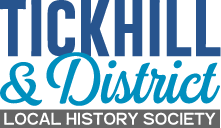

Tickhill Urban District Council 1904
All those on Tickhill’s Register of Electors in 1904 who were eligible to vote in parochial, that is Urban District Council, elections were not able to exercise this right. The UDC minutes of 11 April 1904 record that no poll was held for the three available positions on the Council. Elections had been held in 1901 and 1902 when six candidates stood in each year for the three available places. Nine men were nominated for the three places in 1904, but six withdrew their nominations leaving William Bogg, fish and fruit dealer, Frederick Edgley, farmer, and Joseph Kimberley, mason, to be elected unopposed. What went on behind the scenes to secure this result?
The three new Councillors signed their declaration of acceptance of office and took their seats at the Council meeting on 18 April. (A copy of the form they signed is included in the Minute Book.) At this meeting Thomas Lane was elected Chairman and Thomas Watson Vice Chairman for the following year. The other members of the Council present were James Stothard, Mark Law, and William Hancock. Among the routine business was the appointment of three Overseers of the Poor. The Councillors voted among themselves and agreed the appointment of Joseph Percy (one of the six nominated for election to the Council who stood down), George Bellamy and William Whinfrey. The Medical Officer of Health reappointed for the year, at an annual salary of £20, was Dr C J R McLean of Doncaster. Finally, five of the councillors were appointed to the Finance Committee.
This meeting also noted that rates amounting to £6/11/7 had not been paid. It was decided that this money was unrecoverable and should be written off. The names on the list of those who had defaulted included the Earl of Scarbrough (8/4), Henry Shaw, brickyard owner, (10/5) and Benjamin Brooksbank of Sandrock House (13/1). The General Rate was left unchanged and this was agreed at the 9 May meeting to be 2/6 in the pound.
In the following months, the Council focused on matters such as street lighting, road repairs, planning applications and fencing the quarry at the Friary. The Medical Officer’s report showed how seriously cases of scarlet fever and typhoid were treated. The Surveyor and Inspector of Nuisances were also concerned about the health implications of uncovered or inadequate drains. For example, Mr R Wood was required to connect his property in Back Lane with the sewer.
At the beginning of the 20th Century there is no record of women standing as councillors. For the men who looked after the running of the Council and the general well-being of the community, it was all done in addition to their regular jobs and other responsibilities not least to their families.
The Urban District Council Minute Books are held at Doncaster Archives. The Minute Book covering the period 1901-1907, from which the above information is taken courtesy of the Archives, has reference number TICK/UDC/1/4.